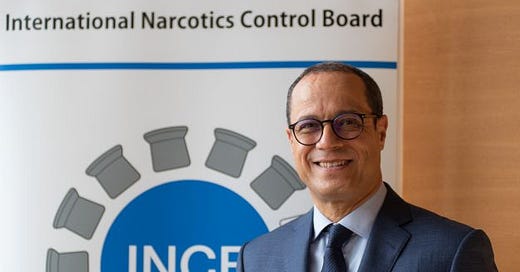Reefer Madness At U.N.-chosen Drug Board
Does Likely U.S. Law Change Have Drug Czars Losing Their Minds?

The playwright who penned that “hell” hath no “fury like a woman scorned” apparently never met an international bureaucrat losing his power.
Faced with declining popular support for cannabis prohibition, increasing scientific acceptance of cannabis to treat an increasing number of conditions (including opioid use disorder) and a growing list of local and national governments that have repealed longstanding cannabis bans, the International Narcotics Control Board (I.N.C.B.) has gone Citizen Kane.
In its annual report, released Tuesday, the I.N.C.B. described itself as “an independent and quasi-judicial control organ, established by treaty, for monitoring the implementation of the international drug control treaties.”
But the Biden State Department, speaking to the United Nations (U.N.) last October, outright rejected the I.N.C.B.’s assertion of “quasi-judicial control” and, more broadly, any treaty-based authority over a country’ domestic drug policies:
It is one thing to argue for more restrictive policies, and, indeed, the Single Convention[ on Narcotic Drugs…] expressly provides for this. But it is another to contend that a treaty means something that it does not say. Good faith means applying the treaties we have, not the ones we wish we had, and it is incumbent upon all of us, states parties and treaty bodies, to apply the terms of the treaties according to their plain meaning. In this regard, we would invite colleagues to read Article Nine of the Single Convention, which details the responsibilities of the International Narcotics Control Board: assisting member states. No mention is found there of monitoring member states. I would also invite the attention of the room to Article Two of the 1988 Convention, where it says the purpose of this convention is to promote cooperation among the parties, so that they may address more effectively the various aspects of illicit traffic in narcotic drugs and psychotropic substances having an international dimension. Again, an international dimension is what our treaty applies to.
More important, the texts of the relevant treaties make clear there is nothing judicial or “quasi-judicial” about the I.N.C.B. It was created under the 1961 U.N. Single Convention on Narcotic Drugs. Its 13 members are elected by the U.N. Economic and Social Council. None of their official biographies indicates any of them was a judge of any kind.
For decades, apparently, the I.N.C.B. has had delusions of grandeur arising from the oldest of addictions: power.
Since the sixties, Washington’s cannabis policy had enabled the I.N.C.B.’s break from reality. Now that Washington is poised to allow medical cannabis nationwide, the I.N.C.B. seems to be in withdrawal.
And denial, too. The board is practically toothless against the United States, which provide more U.N. funding than anyone else. Politically speaking, Democrats are about as unlikely to tighten cannabis policy as Republicans are to cede powers to an international body.
Reality, however, did not stop the I.N.C.B. from scrawling, in bold, that it “underscores” that its founding treaty “requires” nations “to establish as criminal offences” the intentional “sale” of “any narcotic drug or any psychotropic substance” or “cultivation of the cannabis plant for the purpose of the production of narcotic drugs” contrary to international conventions.
Many media have ran with the I.N.C.B.’s treaty-based narrative, apparently without reading the actual treaties, when reporting on Washington’s efforts to regulate and legalize medical cannabis nationwide.
MartyG Reports has read the treaties. Nothing in them requires a nation disallow any drug for medical use. (The treaties expressly allow the “production, manufacture, export, import, distribution of, trade in, use and possession of drugs” for “medical and scientific” purposes.)
And medical use is the Food and Drug Administration’s exact recommendation to the Drug Enforcement Administration. (Though some in the U.S. are advocating the federal legalization of recreational cannabis, the formal recommendation is to move cannabis from Schedule I of the Controlled Substances Act, where one may not possess or use it for any purpose whatsoever, to Schedule III, where, like codeine, one may use or possess it only with a doctor’s prescription.)
Any other interpretation of the treaties and U.S. law is reefer madness.



